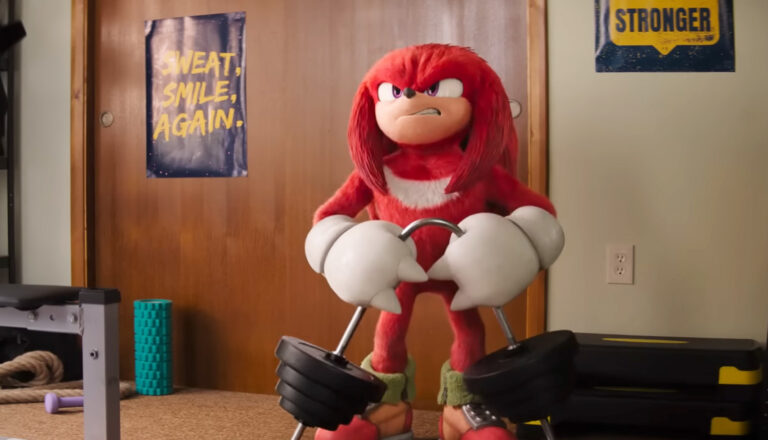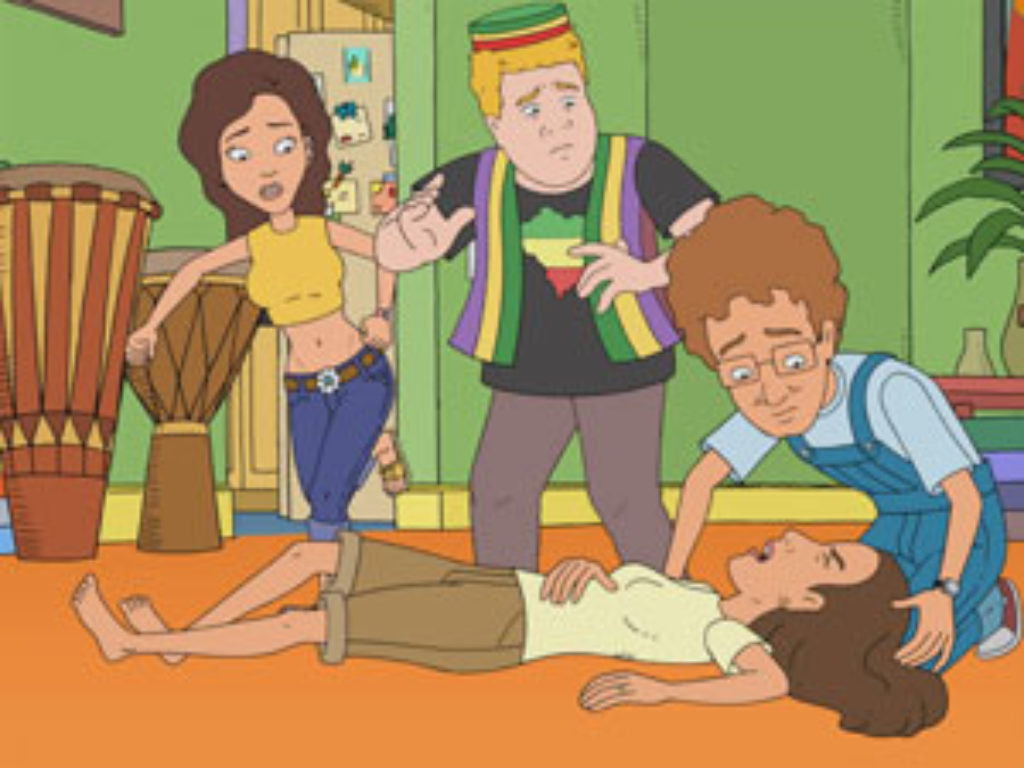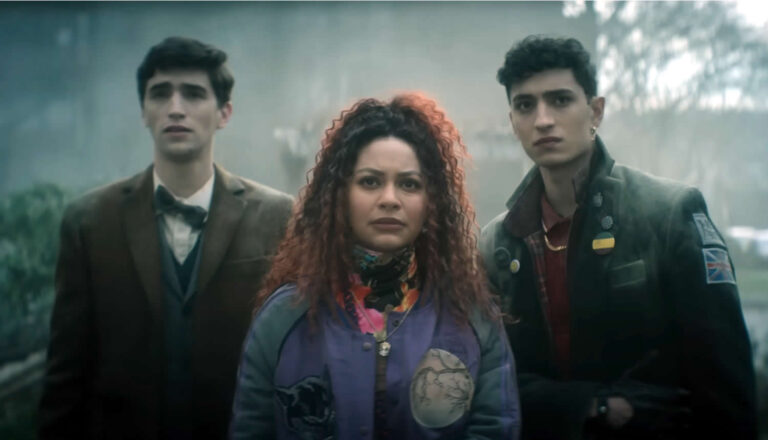
Knuckles
The Sonic spinoff blends explosive adventure and road-trip-buddy-comedy into a fun romp for both kids and diehard fans.

Che loves squirrels—in a bad way. At least, it’s bad for the squirrels.
See, Che–The Goode Family‘s beloved pooch—is a dog. And since the Goodes are all confirmed vegans (one of them wears a “Meat is Murder” T-shirt), Che’s nourished by a steady diet of flaxseed dog food and herb-spiked artificial bones.
Which would be dandy, of course, if Che’s carnivorous inclinations didn’t get in the way. When his masters aren’t looking, Che dines on squirrels, chipmunks and, occasionally, small neighborhood pets—which might explain the bevy of missing-pet posters that have sprouted up around the Goode house.
“That’s why he didn’t touch his breakfast cabbage!” Gerald Goode says as Che starts rooting around a squirrel hole in the family garden. “He’s been holding out for a big fat yam!”
All of which sums up, essentially, what Mike Judge’s latest animated creation is all about: the struggle between doing what’s “right” and doing what we really want to do. It’s a struggle between the better angels of our natures, as Lincoln says, and our more negative impulses.
“What Would Al Gore Do?”
Of course, what’s “right” on this show ironically has a satirical, leftward tilt. With the Goodes, Mike Judge (creator of MTV’s Beavis and Butt-head and Fox’s King of the Hill) has molded the first television jab at the “Yes We Can” generation.
Gerald, the Goode patriarch, is a bicycling professor who takes showers using recycled rainwater. Helen, his wife, is a social activist desperate to impress the local snooty elite. Ubuntu is the Goode’s massive adopted teen. (The Goodes tried to adopt from Africa so that their family might be more racially diverse, but due to a mix-up, Ubuntu wound up being a Caucasian child from South Africa.) Ubuntu gamely tries to fit in. But he has little talent for sculpting the charitable Narwhal-shaped knickknacks the family crafts during spare moments. Only Bliss, the Goode’s teen daughter, seems skeptical of the family’s eco-friendly way of life.
It’s no surprise, then, that the family motto is “What Would Al Gore Do?”
Thus, the Goodes, in some respects, represent the antithesis of traditional Middle America—a postmodern family that scraps religious red-state values for green-world ethics. For example, at one point Gerard is asked to say a pre-game prayer at the local high school booster club. “Dear higher power guy,” Gerald intones, “or gal—”
“His name is Jesus!” a fellow booster interrupts.
Not in Our House
Judge doesn’t ask us to take the Goodes seriously, holding them up for gentle ridicule instead. When the family needs some help with its organic garden, Gerald staunchly refuses to “exploit” Latino workers. “We are not hiring any minorities to do our dirty work,” Gerald says. “That’s racist! It’s whites only at the Goode house!”
But if the Goodes at times seem ridiculous, they are sweetly so, and the show’s comedic moments spring from their well-meant intentions. Family members regularly sacrifice comfort, pleasure and popularity to do what they believe is right, even as they go outside their own comfort zones to support one another.
Several examples can be found in the show’s second episode, “Pleatherheads.” When the Goodes’ neighbors encourage Ubuntu to go out for the high school football team, the family gets thrust into a world far different from the one they’ve fostered for themselves. “You mean tackle football?” Gerald exclaims. “Like in the movies?” Helen’s staunchly against the whole idea, remembering her own upbringing in a football-crazed family. “One minute, I’m playing with my dolls, the next I’m dressing Ken up like a Raider and burning him in effigy,” she says.
Gerald and Helen finally acquiesce, and Ubuntu proves to be the team’s star. But he nearly quits when the boosters try to kill a pig (sort of a good-luck superstition) before homecoming. Gerald and Ubuntu wind up saving the little porker. “Live out the rest of your gentle life in peace,” Gerald whispers—right before the pig attacks him like a rabid pit bull.
Paradoxical Parallels
As I watched, I was struck by how similar the Goodes are, in their own way, to many conservative Christian families.
Really.
Now, don’t get me wrong: This is in no way a Christian show—or even a Christian-friendly one. The pilot episode, which I didn’t see, reportedly lampooned Christian-themed chastity pledges and purity balls. A later episode, which I did see, revolved around two homosexual couples and the Goodes’ efforts to befriend them (motivated initially by Helen’s desire to climb to the top of the local art scene).
But here’s the paradox: The Goodes clearly treasure their family and go out of their way to make little sacrifices for one another. Moreover, they’re willing to sublimate their own wishes and will for a cause they believe is greater than themselves. The Goodes deny themselves hot running water, for example, in much the way some Christians might deny themselves food during a fast. Helen succumbs, then fights, her addiction to football in much the same way Christians might battle their own temptations and addictions. Ubuntu reins in many of his own blue-collar inclinations out of respect for his family’s educated ethos. And the family, in turn, learns to embrace Ubuntu’s own set of skills for what they are: a bit of beautiful familial diversity.
Conflicting Content
For all that might be interpreted in a positive light, however, there are some significant problem areas. The Goode Family is no cartoon for kids. Several scenes in the episodes I viewed showed animated female-on-female kissing, for example. Add to that the way Helen’s father speculates about the root causes of lesbianism—speculation based, apparently, on his extensive porn collection. Another episode features a bizarre marsupial so loathsome that, we’re told, members of this species don’t willingly mate. During a short nature-show snippet, we learn that the males must release a chemical that renders would-be female mates unconscious, allowing the male to “non-consensually ‘date’ the female for up to 17 hours.”
Language is on the edgy side, too, spattered with words such as “d–n,” “suck,” “crap” and many abuses of God’s name. Some of the jokes are crude. And the attitudes and values displayed by the show’s characters definitely could be puzzling for those unwilling or unable to wade into Mike Judge’s world of animated satire. (For comparison’s sake, the content here seems a step more extreme than what you’d expect to see in The Simpsons.)
Episodes Reviewed: June 3, 12, 19, 2009


Paul Asay has been part of the Plugged In staff since 2007, watching and reviewing roughly 15 quintillion movies and television shows. He’s written for a number of other publications, too, including Time, The Washington Post and Christianity Today. The author of several books, Paul loves to find spirituality in unexpected places, including popular entertainment, and he loves all things superhero. His vices include James Bond films, Mountain Dew and terrible B-grade movies. He’s married, has two children and a neurotic dog, runs marathons on occasion and hopes to someday own his own tuxedo. Feel free to follow him on Twitter @AsayPaul.

The Sonic spinoff blends explosive adventure and road-trip-buddy-comedy into a fun romp for both kids and diehard fans.

Dead Boy Detectives targets teens in style and story. But it comes with very adult, problematic content.

An elf mage contemplates on connection and regret as she watches her human friends grow old and pass away.